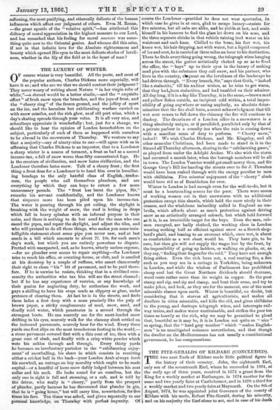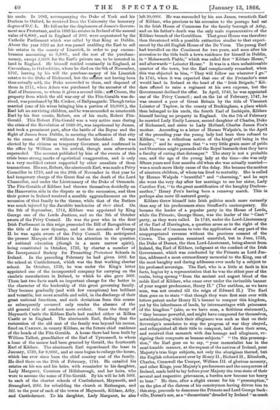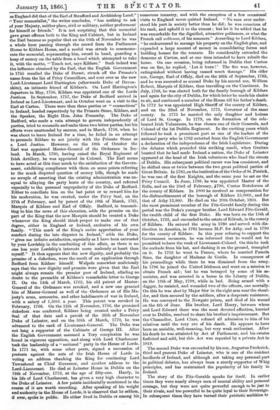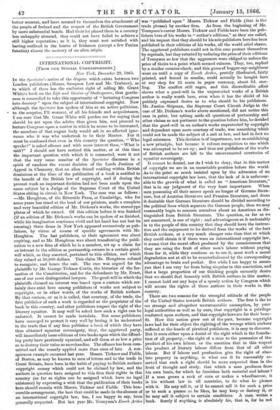THE FITZ-GERALDS OF KILDARE (CONCLUDED).
THE two next Earls of Kildare made little political figure in the history of their country. John, the eighteenth Earl, only son of the seventeenth Earl, whom he succeeded in 1664, at the early age of three years, received in 1672 a grant from the King for a weekly market at Rathangan, in 1674 another for the same and two yearly fairs at Castledermot, and in 1678 a third for a weekly market and two yearly fairs at Maynooth. On the 8th of August, 1674, he was appointed joint Governor of the county of Kildare with his uncle, Robert Fitz-Gerald, during his minority, and on his majority the Earl alone to set, and in case of his death his uncle. In 1683, accompanying the Duke of York and his Ducheis to Oxford, he received from the University the honorary degree of D.C.L. He fell under the displeasure of James's Govern- ment as a Protestant, and in 1689 his estates in Ireland of the annual value of 6,800/, and in England of 2001. were sequestered by the Catholic Parliament which was called by that King at Dublin. About the year 1692 an Act was passed enabling the Earl to sell his estates in the county of Limerick, in order to pay encum- brances amounting to 9,3001., and the rest of the purchase- money, except 2,0001. for the Earl's private use, to be invested in land in England. He himself resided constantly in England, at Caversham, in Oxfordshire, where he died on the 9th of November, 1707, leaving by his will the purchase-money of his Limerick estates to the Duke of Richmond, but the es!ates not having been then actually sold, the Duke succeeded to them, and disposed of them in 1711, when Adare was purchased by the ancestor of the Earl of Dunraven, to whom it gives a second title ; and Croom, the property from which the old war-cry of the Fitz-Geralds was de- rived, was purchased by Mr.•Croker, of Ballynagarde. Though twice married (one of his wives bringing him a portion of 10,0001.), the Earl left no surviving children, and he was succeeded as nineteenth Earl by his first cousin, Robert, son of his uncle, Robert Fitz- Gerald. This Robert Fitz-Gerald was a very active man during the crisis of the Revolution of 1689-90„ was imprisoned by James, and took a prominent part, after the battle of the Boyne and the flight of James from Dublin, in securing the adhesion of that city to the cause of William without further bloodshed. He was elected by the citizens as temporary Governor, and confirmed in the office by William on his arrival, though soon afterwards superseded. The account published by him of the events of this crisis bears strong marks of egotistical exaggeration, and is only to a very modified extent supported by other annalists of those transactions. His son, Robert, the nineteenth Earl, was made a Privy Councillor in 1710, and on the 28th of November in that year he had temporary charge of the Great Seal on the death of the Lord Chancellor, and under the Lieutenancy of the Duke of Ormonde. The Fitz-Geralds of Kildare had thrown themselves decidedly on the Hanoverian aide in the dispute as to the succession, and thus their power in Ireland received a sensible aggrandizement on the accession of that family to the throne, while that of the Butlers was much injured by the Jacobite tendencies of their chief. On the 9th of September, 1714, Kildare was appointed by King George one of the Lords Justices, and on the 9th of October sworn of the Privy Council. He was the peer who in the first' Irish Parliament in this reign presented the Bill of Recognition of the title of the new dynasty, and on the accession of George H. he was again sworn of the Privy Council. He anticipated the present Marquis of Kildare in his attention to the question of national education (though in a more narrow spirit), being constituted in October, 1733, by charter a member of the Incorporated Society for Promoting Protestant Schools in Ireland. In the preceding February he had given 5001. for the school at Castledermot, which was the first working charter school. In October, 1739, he was under the King's letter appointed one of the incorporated company for carrying on the cambric manufacture in Ireland, to which he also gave 5001. These last two facts mark an important change for the better in the character of the leadership of this great governing family. They became gradually (and with few exceptions) less brilliant and versatile, but more sensible and solid, in the discharge of their great national functions, and such deviations from this course as subsequently occurred only render the absence of the old general rule of conduct more evident. Since the decay of Maynooth Castle the Kildare Earls had resided either at Kilkea Castle or in England. The nineteenth Earl, finding that the restoration of the old seat of the family was beyond his means, fixed on CARTON, in county Kildare, as the future chief residence of the heads of the Fitz-Geralds. A house there had been built by William Talbot, grandfather of the Earl of Tyrconnell, to whom a lease of the manor had been granted by Gerald, the fourteenth Earl of Kildare. The nineteenth Earl repurchased the lease in January, 1739, for 8,0001., and at once began to enlarge the house, which has ever since been the chief country seat of the family. He died there on the 20th of February, 1744. He entailed his estates on his son and his heirs, with remainder to his daughter, Lady Margaret, Countess of Hillsborough, and her heirs, who were to assume the name of Fitz-Gerald. By his will he left 5001. to each of the charter schools of Castledermot, Maynooth, and Strangford, 2001. for rebuilding the church at Rathangan, and 501. to the poor of each of the towns of Maynooth, Kildare, Athy,
left 20,0001. He was succeeded by his son James, twentieth Earl of Kildare, who previous to his accession to the peerage had sat in the Irish House of Commons for the family borough of Athy, and on his father's death was the only male representative of the Kildare branch of the Geraldines. That great House was therefore then threatened with a possible extinction similar to that experi- enced by the old English House of the De Veres. The young Earl had travelled on the Continent for two years, and soon after his accession to the title built a town residence for himself in Dublin, in " Molesworth Fields," which was called first "Kildare House," and afterwards " Leinster House." It was in a then unfashionable quarter of the town, but the Earl complacently remarked, when this was objected to him, " They will follow me wherever I go." In 1745, when it was expected that one of the Pretender's sons would land in Ireland at the head of the " Irish Brigade," Kil- dare offered to raise a regiment at his own expense, but the Government declined the offer. In April, 1746, he was appointed one of the Privy Council ; and on the 1st of February, 1747, he was created a peer of Great Britain by the title of Viscount Leinster of Taplow, in the county of Buckingham, a place which then belonged to his uncle, the fourth Earl of Inchiquin, Kildare himself having no property in England. On the 7th of February he married Lady Emily Lennox, second daughter of Charles, Duke of Richmond, and sister to Lady Holland, Charles James Fox's mother. According to a letter of Horace WalpOle's, in the April of the preceding year the young lady had been then refused to Kildare, "on a ridiculous notion of the kings' evil being in the family ;" and he suggests that " a very little grain more of pride and Stuartism might persuade all the Royal bastards that they have a faculty of curing that distemper." The story is not a probable one, and the age of the young lady at the time—she was only fifteen years and four months old when she was actually married— was a much more likely cause of the delay. She became the mother of nineteen children, of whom ten lived to maturity. She is called by Horace Walpole " beautiful " and "charming," and he says she went the very day after her marriage to see her sister, Lady Caroline Fox, " to the great mortification of the haughty Duchess- mother," Henry Fox's having been a runaway match. This is perhaps also mere ill-natured gossip.
Kildare threw himself into Irish politics much more earnestly than any of his predecessors since Strafford's contemporary. He became the leader of a popular party in the House of Lords,. while the Primate, George Stone, was the leader of the " Cant " party, as they were called. In 1749, under the Lord-Lieutenancy of the Earl of Harrington, a question arose as to the right of the Irish House of Commons to vote the application of any part of the unappropriated revenue without the previous consent of the Crown. The question remained unsettled, but in June, 1753, the Duke of Dorset, the then Lord-Lieutenant, being absent from Ireland, the Earl of Kildare, indignant at the conduct of the Irish Government, which was conducted by the Primate as Lord Jus- tice, addressed a most extraordinary memorial to the King, one of the most haughty and daring addresses ever made by a subject to his professed sovereign. The Earl, who is a little at fault in his facts, begins by a representation that he was the eldest peer of the realm, being sprang "from the ancient and august blood of the noble Earl of Kildare, who came over under the invincible banner of your august predecessor, Henry II." (The earldom, as we have seen, was not created till the reign of Edward II.) The Earl then goes on to state " that though they were first sent over with letters patent under Henry Il.'s banner to conquer this kingdom, yet by the inheritance of lands, by intermarriages with princesses of the kingdom" (also, as we have seen, a fictitious statement), " they became powerful, and might have conquered for themselves, notwithstanding which their allegiance was such as that on their Sovereign's mandates to stop the progress of war they obeyed, and relinquished all their title to conquest, laid down their arms, and received that monarch with due homage and allegiance, re- signing their conquests as became subjects." " On this presump- tion," the Earl goes on to say, " your memorialist has in the most humble manner, at the request of the natives of Ireland, your Majesty's true liege subjects, not only the aborigines thereof, but the English colonies sent over by Henry II., Richard II., Elizabeth, Charles, Cromwell the Usurper, William III. of glorious memory, and other Kings, your Majesty's predecessors and the conquerors of Ireland, made bold to lay before your Majesty the true state of their several and respective grievances, a burden now become too heavy to bear." He then, after a slight excuse for his "presumption," on the plea of the distress of his countrymen having driven him to this step, proceeds to denounce the Primate and Lord George Sack- and Castledermot. To his daughter, Lady Margaret, he also 1 vine, Dorset's son, as a "dnumTirato" dreaded by Ireland "as much as England did that of the Earl of Strafford and Archbishop Laud." " Your memorialist," the writer concludes, " has nothing to ask of your Majesty, neither place, civil or military, neither preferment for himself or friends." It is not surprising that this memorial gave great offence both to the King and Cabinet, but in Ireland the Earl became so popular that on the 16th of November he was a whole hour passing through the crowd from the Parliament House to Kildare House, and a medal was struck to commemo- rate the memorial, representing him, sword in hand, guarding a heap of money on the table from a hand which attempted to take it, with the motto, " Touch not, says Kildare." Such indeed was the influence obtained by the Earl, that the English Government in 1755 recalled the Duke of Dorset, struck off the Primate's name from the list of Privy Councillors, and sent over as the new Lord-Lieutenant Lord Hartington (afterwards Duke of Devon- shire), an intimate friend of Kildare's. On Lord Hartington's departure in May, 1756, Kildare was appointed one of the Lords Justices. In September, 1757, the Duke of Bedford arrived in Ireland as Lord-Lieutenant, and in October went on a visit to the Earl at Carton. There were then three parties or " connections" in Ireland, headed respectively by the Primate Stone, Kildare, and the Speaker, the Right Hon. John Ponsonby. The Duke of Bedford, who made a vain attempt to govern independently of parties, tried to reconcile and unite these two bitter parties, but his efforts were unattended by success, and in March, 1758, when he was about to leave Ireland for a time, he failed in an attempt to persuade Kildare to act jointly with the Primate Stone as a Lord Justice. However, on the 18th of October the Earl was appointed Master-General of the Ordnance in Ire- land. In March, 1760, having raised the Royal Regiment of Irish Artillery, he was appointed its Colonel. The Earl seems to have acted at this time much to the satisfaction of the Govern- ment, exhibiting compliance with them on some points referring to the much disputed question of money bills, though he made no scruple of asserting that the existing administration was un- equal to allaying the party heats of the country, and referred especially to the personal unpopularity of the Duke of Bedford. Either to conciliate him on the last point or to reward him for his moderation, he was created, under the Privy Seal, on the 27th of February, and by patent of the 19th of March, 1761, Marquis of Kildare and Earl of Offaly. Bedford, in transmit- ting to him the news of this elevation, adds the promise on the part of the King that the new Marquis should be created a Duke whenever the King should think proper to make one of that degree, either in England or Ireland, exclusive of his own family. " This mark of the King's entire approbation of your conduct during the late disputes in Ireland," adds the Duke, " gives me infinite satisfaction, especially as I have been entrusted by your Lordship in the conducting of this affair, as there is no one has your Lordship's interests more zealously at heart than myself." It thus appears that the new dignity, and probably the promise of a dukedom, were the result of an application through Bedford from Kildare himself. Walpole somewhat maliciously says that the new dignity and promise were given that the Earl might always remain the premier peer of Ireland, alluding no doubt to the preamble of Kildare's remarkable letter to George II. On the 14th of March, 1763, his old patent of Master- General of the Ordnance was revoked, and a new one granted him of Master-General as well of the Ordnance as of His Ma- jesty's arms, armouries, and other habiliments of war in Ireland, with a salary of 1,5001. a year. This patent was revoked in February, 1766. On the 12th of November, 1766, the promised dukedom . was conferred, Kildare being created under a Privy Seal of that date and a patelit of the 26th of November Duke of Leinster, and on the 30th of March, 1770, he was advanced to the rank of Lieutenant-General. The Duke was not long a supporter of the Cabinets of George III. After the English Government assumed a Tory complexion he was found in vigorous opposition, and along with Lord Charlemont took the leadership of a " national" party in the House of Lords. In 1771 he, with some other peers, signed a succession of protests against the acts of the Irish House of Lords in voting an address thanking the King for continuing Lord Townshend as Chief Governor, and another address to the Lord-Lieutenant. He died at Leinster House in Dublin on the 19th of November, 1773, at the age of fifty-one. Hardy, in his life of Lord Charlemont, has given a very high character to the Duke of Leinster. A few points incidentally mentioned in the course of it are worth recording. After speaking of his weight and authority in the House of Lords, it is observed that he seldom, if ever, spoke in public. He either lived in Dublin or among his numerous tenantry, and with the exception of a few occasional visits to England never quitted Ireland. " No man ever under- stood his part in society better than he did ; he was conscious of his rank, and upheld it to the utmost ; but let it be added that he was remarkable for the dignified, attractive politeness, or what the French call nobleness, of his manners." According to Lord Kildare, "he endeavoured to manage his property on the English plan, and expended a large amount of money in consolidating farms and building houses for the tenants. He considerably extended the demesne at Carton, and at one time intended to have rebuilt the house. On oue occasion, being informed in Dublin that Carton was on fire, he replied, ' Let it burn ! ' The fire was, however, extinguished without having caused much damage." His elder son, George, Earl of Offaly, died on the 26th of September, 1765, and he was succeeded as second Duke by his second son, William Robert, Marquis of Kildare, then travelling on the Continent. In July, 1768, he was elected both for the family borough of Kildare and again for the city of Dublin, for which latter he made his choice to sit, and continued a member of the House till his father's death. In 1772 he was appointed High Sheriff of the county of Kildare, and on the 22nd of November, 1773, Governor of the same county. In 1775 he married the only daughter and heiress of Lord St. George. In 1779, on the formation of the cele- brated Irish Volunteers, he was chosen one of their Generals, and Colonel of the 1st Dublin Regiment. In the exciting years which followed he took a prominent part as one of the leaders of the national party who in 1782 extorted from the English Government a declaration of the independence of the Irish Legislature. During the debates which preceded this striking result, when Grattan boasted that he had made Ireland a nation, the Duke of Leinster appeared at the head of the Irish volunteers who lined the streets of Dublin. His subsequent political career was less consistent, and he shifted once or twice between the two great political parties of Great Britain. In 1783, on the institution of the Order of St. Patrick, he was one of the first Knights, and the same year he sat on the Privy Council. In June, 1788, he was appointed Master of the Rolls, and on the 23rd of February, J798, Custos Rotulorum of the county of Kildare. In 1800 he received as compensation for the disfranchisement of the borough of Kildare 15,0001., and for that of Athy 13,800. He died on the 20th October, 1804. But the most prominent member of the Fitz-Gerald family during this period was the Duke's younger brother, Lord Edward Fitz-Gerald, the tweith child of the first Duke. He was born on the 15th of October, 1763, and succeeded to the estate of Kilrush, in the county of Kildare. He entered the army in 1780 and served with dis- tinction in America, in 1783 became M.P. for Athy, and in 1790 for the county of Kildare. In this year refusing to support the Government measures, he was informed that be would not be permitted to have the rank of Lieutenant-Colonel. On this he took the cockade from his hat, and dashing it on the ground, trampled on it. In 1792 he went to France, where he married Pamela Sims, the daughter of Madame de Genlis. In consequence of his proceedings while there he was dismissed from the army. In 1796 he joined the United Irishmen and went on a mission to obtain French aid ; but he was betrayed by some of his as- sociates, and was arrested in a house in the Liberty of Dublin, on the 19th of May, 1798, while in bed. Being armed with a dagger, he resisted, and wounded two of the officers, one mortally. On this he was shot by Major Sirr in the right arm near the shoul- der, and then secured by the soldiers, after a desperate resistance. He was conveyed to the Newgate prison, and died of his wound on the 4th of June. His brother, Lord Henry, between whom and Lord Edward there was the most devoted affection, hurried over to Dublin, resolved to share his brother's imprisonment. But the Chancellor, Lord Clare, refused all admission to him of his relatives until the very eve of his death. He appears to have been an amiable, well-meaning, but very weak enthusiast. After his death he was attainted by Act of Parliament, and his estates forfeited and sold, but this Act was repealed by a private Act in 1819.
The second Duke was succeeded by his son, Augustus Frederick, third and present Duke of Leinster, who is one of the resident landlords of Ireland, and although not taking any personal part in political debates, has always been a sturdy supporter of Whig principles, and has maintained the popularity of his family in Ireland.
The story of the Fitz-Geralds speaks for itself. In earlier times they were nearly always men of mental ability and personal courage, but they were not quite powerful enough to be just to their rivals, and too powerful to be quite loyal to their Sovereign. In subsequent times they have turned their patriotic ambition to
better account, and have secured to themselves the attachment of the people of Ireland and the respect of the British Government by more substantial bonds. Had their lot placed them in a country less unhappily situated, they could not have failed to achieve a still higher reputation ; as it is, they must rest satisfied with having outlived in the hearts of Irishmen (except a few Fenian fanatics) almost the memory of an alien origin.

































 Previous page
Previous page